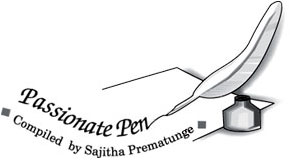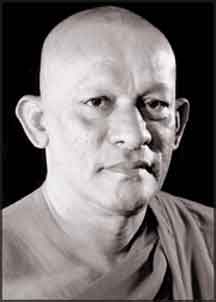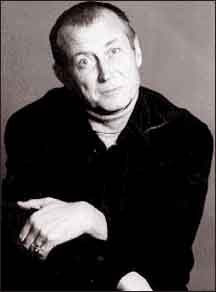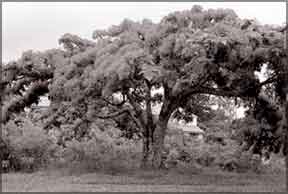
Epistle in the form of song
By Lakmal Welabada
[email protected]
A child who refuses to consume bitter medicine could be persuaded to
swallow it happily if it is dipped in some sweet. The medicine though it
tastes bitter should be taken in order to cure the illness one suffers
from.
Rambukkana Siddhartha Thera also practices the same sort of method,
not as a Medical practitioner, but as a composer of songs, encompassing
the deep roots of the Buddhist philosophy in a few simple words.
Rambukkana Siddhartha Thera has been using `song’ to deliver the
great message of dhamma. A lot remains to be said about the literary
work of this `Sindu liyana Hamuduruvo’ (the priest who writes songs)
which he does without any lucrative expectation, but out of sheer
enthusiasm for art which he mingles with his conviction in Dhamma.
|

Ven. Rambukkana Siddhartha Thera |
The Thera who was born on May 22 in 1950, co-incidentally on a Vesak
Full Moon Poya Day - Rambukkana, Moravakkorale in the Matara District -
was named as Ananda Liyanage by his parents Simon and Sobanahamy
Liyanage. Ananda was the eldest in a family of five boys and two girls.
He had his primary education at Veliva Vidyalaya. He was ordained at
Gangathilakaramaya at the age of 12.
Siddhartha Thera has studied in several Pirivenas including
Sunethradevi Pirivena, Pepiliyana, Colombo, and graduated from the
University of Kelaniya in Buddhist Philosophy (Sp. Hons).
He studied Mass Communication as an auxiliary subject. He also worked
for Lake House Sinhala publications such as Silumina and Navayugaya, for
a brief period, on a voluntary basis.
This opened him great opportunities to associate many exceptionally
skilled journalists and intelligentsia like Edmond Ranasinghe, Dayasena
Gunesinghe, Somaweera Senanayaka, Edwin Ariyadasa and Gamini
Sumanasekara, which helped him to sharpen his talents in his literary
work.
Siddhartha Thera has won many awards for his excellent ability and
incomparable talent including the State Literary Award for the Best
Collection of songs for his Sasara Danavuva in 2006.
His first film song, Pera Sansare for the film Sandakada Pahana sung
by T.M Jayaratne and late Malini Bulathsinhala and music composed by
Khemadasa won the Best Film Song Award in the Sarasavi Awards Festival
in 1989. Yathivara Pooja which Siddhartha Thera conducted on Sirasa TV
won the Best Musical Programme Award recently.
“In ancient Ceylon, Buddhist priests used to preach Bana for 12
hours. Unlike today, our ancestors who didn’t have much entertaining
avenues like TV and radio, Bana was the only way of adding variety to
their lives. So none of the villagers missed out on it,” begins
Siddhartha Thera.
“The Bana which began with sunset went on till next dawn. The whole
village used to gather to the temple, and spent the whole night there
without a fear of their home and property, left behind. People had time,
patience, peace of mind and a sense of security to concentrate on the
sermon and glean a virtuous harvest to lead a noble life.
But unlike yesteryears, today’s generations rarely get such peace of
mind. Hence, I assume `song’ which is somewhat closer to the hearts and
minds of today’s people would be a somewhat better medium to pass on a
religious as well as a social message,” he points out.
Even the Buddha used rhythm in his Bana, which we’ve later described
as `Gatha’ and `Sutra’. Following this Buddhist priests too used rhythm
as `Kavi Bana’ which has been popular among Sri Lankans. “In this sense
The Buddha has been the greatest lyric composer born to this world,”
points out Siddhartha Thera. Singer Victor Ratnayaka’s famous song
Buduhamuduruvo Apith dakinnathi banath ahannathi ekale.
Niwandakinnata pinmadiwennathi ekai thawamath sansare.
(we might have been living during the time of the Buddha, and might
have met and listened to his sermons. But, we might not have collected
enough merits to attain nibbhana, and that’s why we are still in this
Samsara) has been one of the popular hits Siddhartha Thera has written
his songs affiliating Buddhist cultural norms and philosophy. In this
song, the Thera has tried to encourage lay people to realise the gravity
of `Samsara’.
Thrilokya Thilaka Buddharaja vandana vile, the song he wrote for `Sambuddha
Jayanthi’ ceremony in 2006, Pihitak nathi saranak nathi - Sasara danauve
(sung by Gunadasa Kapuge), Pipena Malakata galana Dolakata (sung by late
Malini Bulathsinhala) and a vast number of songs sung by the famous
singer duo Visharada Edward Jayakody and Charitha Priyadarshani such as
Pansale Palliye, Hari hambakarapudeval, Minisa handata giyalu,
Sapasampath nam miringuva passe and Budu bana kivuvath niranthare are
some of the Buddhist songs the Thera has written using his rich
knowledge in the Sinhala language.
`Nachcha geetha vaditha visuka dassana mala gandha vilepana dharana
mandapa.....’ is one of the precepts of `Ata Sil’ (eight precepts of
Buddhism) which says that one should avail from all the worldly
pleasures including entertainment of various sorts. This precept is
observed by bhikkus.
One would argue that composing lyrics too falls into this category
and therefore is not agreeable with the expected conduct of a bhikku.
But the thera explained that he too follows the method of preaching with
`rhythm’ as the Buddha and his followers. “`Song’ which I have adopted
as my medium, to suit today’s world, is a further step in the evolution
of `rhythm’.
I’ve penned a few love songs as well, but even in them, I do not
emphasise on the worldly pleasures including `lust’ as in some songs,
which arouse intimate desires. I have written about `love’, but that
with a different angle. The below verse sung by Abeywardhana Balasuriya
is an example of it.
Maleka meleka hitha ganna
Bari athakin mal nelanna
Epa yaaluve....
Hithaka meleka hitha ganna
Bari hithakin pem karanna
Epa yaluve....’
Do not try to pluck a flower
If you don’t know the softness of a flower
Do not love
If you cannot grasp the fragility of a heart
Rambukkana Siddhartha Thera pours sensitivity into the natural love
between two hearts, and suggests that it is not merely the infatuation
that matters in one’s relationship, but mildness and tolerance.
In his song Kandulu pan kendiyak... sina mal vattiyak composed for
Victor Ratnayaka, Siddhartha Thera tries to describe some unseen reality
in life.
“We were all born to this world due to the natural attraction caused
between a man and a woman who became our parents. That is the truth of
this Samsara. We cannot deny that. Young men and women fall in love and
live in a beautiful dream world. But, the gravity that exists beyond
that which will burst out with their marriage, would be totally
different from what they experience in their love life.
The difficulties they encounter later in life may cause their palace
of love to collaps. Hence, one must tread the path of love with
conscience as it is not going to be full of roses everyday,” says Thera.
“Yashodharavatha is one of the best ever works of literature I have
ever read. A few chosen words would not be able to describe the
unconditional love Princess Yashodara (chief consort of Prince
Siddhartha) had towards her husband who left her and the only son Rahula
in quest of Buddhahood. I’ve tried to add the qualities of the
unblemished character of Yashodara into my lyrics many a time,” says the
Thera. La dalu bopath semin salena se, sung by Karunaratne Divulgane, is
one such verse penned by the Thera delineating Yashodara’s love.
“I’ve tried to give the message of the unconditional love that a wife
should posses for her spouse. It’s difficult to find such love in
today’s society, still the message should be passed on.” believes the
Thera.
Siddhartha Thera opens his heart to let the flow of compassionate
kindness gush through his pen, and the songs like Pipila paravena
suvanda kakulu mal (Edward Jayakody), `Avuvata vessata huru minisunne’ (T.M
Jayaratne, Ivor Denis, Amarasiri Peiris and late Malani Bulathsinhala)
and Me prema katha navatha mohothak (Edward - Charitha) provoke the
listener to think beyond their limited enclosure, and ponder on the
poverty and suffering of the masses.
Sanda tharu mal - mata dan dun sung by Samitha and Athula Adikari is
one of his best products which describes the unconditional love of
parents for their children. He uses various imagery from nature; sun,
moon and stars; the universal strength and energy to relate to parental
love.
Let me conclude with two lines of T. M. Jayaratne’s popular song
written by Siddhartha Thera alias `Sinduven bana kiyana hamuduruvo’ (the
Buddhist priest who preaches in `songs’)....
Siyak Aayu laba - Mageth ayu laba
Matath vada kal - Oba jeevath veva...
(May you be blessed with long healthy life....)

Politically outspoken
Yevgeny Yevtushenko:
Best known poet of the post-Stalin generation of Russian poets,
Yevtushenko was born in Zima, Irkutsk in July 18, 1933. Since 1990 he
has been vice president of Russian PEN. He was appointed an honourary
member of the American Academy of Arts and Sciences in 1987.
Yevtushenko published his first poem in 1949 in a Soviet sports
magazine and thereafter became a regular contributor to Komsomolskaya
Pravda, Literaturnaya Gazeta, Novy Mir, and other important Soviet
publications.

As a result of the success of his first book of poetry, The
Prospectors of the Future, he joined the Soviet Writers’ Union and began
studying at the Gorky Literary Institute, which he left after several
years without graduating.
Although he is best known for his poems, since the 1970s he has been
active in many fields, such as writing novels, engaging in acting, film
directing, and photography. Yevtushenko contributed lyrics to several
Soviet films and contributed to the script of Soy Cuba, a soviet
propagandist film.
His acting career began with the leading role in Vzlyot by director
Kulish, as a Russian rocket scientist named Tsiolkovsky. Yevtushenko
also wrote and directed two films. His film ‘Detsky Sad’ and his last
film, Pokhoromy Stalina deal with life in the Soviet Union. In 1972
Yevtushenko gained huge success with his play Under the Skin of the
Statue of Liberty.
But his The Heirs of Stalin, published in Pravda, was not republished
until 1987. The poem contained warnings that Stalinism had long outlived
its creator. He has also remained politically outspoken and in 1974
supported Solzhenitsyn.
Poems of Several Years, a retrospective anthology, contained most of
Yevtushenko’s best shorter poems. In 1991, a collection of his work
called Fatal Half Measures, was published by Random House. Centered
around the themes of glasnost and perestroika, the book contained
excerpts from several earlier works, all supporting Yevtushenko’s strong
political conviction.
Third Snow, his second book of poems, was heavily attacked by
critics. Other volumes of verse were published in 1956 and 1957.
His first important narrative poem Zima Junction was published in
1956 but gained international fame only in 1961 with Babi Yar, in which
he denounced Nazi and Russian anti-Semitism. The poem was not published
in Russia until 1984, although it was frequently recited in both Russia
and abroad.
Zima Junction relates a visit to his home town in 1953 and reflects
the confusion and quest for lost values of a young man in post-Stalinist
Russia.
His themes, both personal and social, were marked by a nonconformist
attitude and conveyed a strong feeling of human sympathy.
Compiled by Ishara Mudugamuwa
[email protected]

Meditation and poetry

Waves of thoughts roll and embrace,
The shore of creativity with their grace,
The rhythm, the patterns - still genuine,
Though my mind fails to take them in.
I am a sailor in the stormy ocean,
And floats aimlessly on the boat to oblivion,
The direction and purpose I can’t recall,
As my mind can’t absorb anything at all.
Taming mind like the deep sea,
To perceive beauty, truth and reality,
Is a wonder only a few can perform,
When their thoughts set in poetic form.
A Jayalath Basnagoda
The Promise
The new orange-brown pot,

Reposing on a make-shift stove,
Of three new bricks,
Near the malpela
Where every kemmura day,
An oil lamp is lit,
For the numberless deities,
Supposedly ruling our world,
Is filled almost to the brim,
With coconut milk,
Of the purest, snowiest white,
And a fistful of kekulu rice,
Is cast into the pot....
Squatting near the new hearth,
Appachchi stokes up the fire,
By blowing,
And adding faggots,
Lying scattered on the ground near him....
Milk begins to boil and spill over,
With bubbly foams,
And snowy froth....
And the frothy, bubbly, foamy, snowy milk,
Slopping over the brim,
Renews the flimsy, filmy, fragile, false promise,
Of a cornucopia of wealth!
Jayashantha Jayawardhana.
Peradeniya in May
Living every road and by lane

Shady arcades abloom in clusters
Flame topped branches
Spanning the sky in proud flamboyance
Setting the heavens ablaze
While spent blossoms, like scarlet butterflies,
Break free, float down to settle softly
Over lovers seeking shelter below,
Lost in their own world of flame and fire
Malini Epa |
